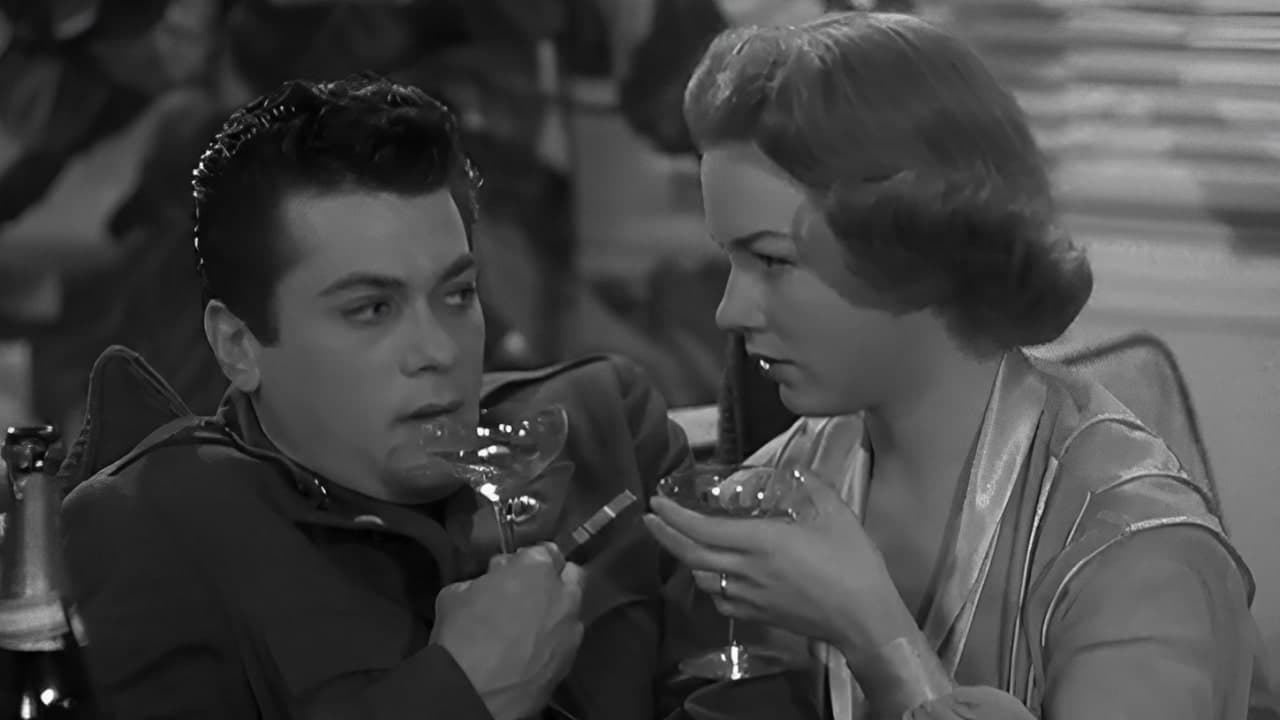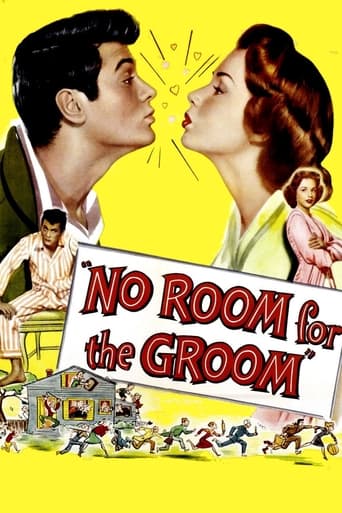Hellen
I like the storyline of this show,it attract me so much
Phonearl
Good start, but then it gets ruined
StyleSk8r
At first rather annoying in its heavy emphasis on reenactments, this movie ultimately proves fascinating, simply because the complicated, highly dramatic tale it tells still almost defies belief.
Sienna-Rose Mclaughlin
The movie really just wants to entertain people.
bkoganbing
When they were young contract players at Universal Pictures Tony Curtis and Piper Laurie made four pictures together, Tony was teamed with her almost as much as with his own wife Janet Leigh. Even though No Room For The Groom was about a young married couple unable by circumstances to consummate the deed, these two never consummated anything in real life according to Curtis in his memoirs. Romance surely would have been killed by an airing of this film.Tony plays a young GI on leave to get married to sweetheart Piper Laurie, but on his wedding night comes down with chicken pox. Back to Korea for 10 months before the deed is done, but he allows his bride to move into his house. And Piper moves in with her mother and a dozen or so deadbeat relatives. This is what Tony comes home to and in addition Piper has never told her mother Spring Byington that they're married because Spring wanted her to marry Don DeFore the richest guy in town and who Piper works for.A nice cast is really thoroughly wasted on this tripe. Why Curtis just didn't throw them all out bag and baggage and get down to business still eludes me. I was also surprised that Douglas Sirk who directed some of Universal's best dramas with Rock Hudson in the Fifties was in charge of this mess. I guess he was just fulfilling contractual obligations and couldn't wait to get to a Hudson film. The film does have a hurried look to it, like everyone wanted to get on to other projects.Fortunately Tony Curtis and Piper Laurie went on to do much better work in the Fifties than No Room For The Groom.
dbdumonteil
Some people are going to dismiss "No room for the groom" because it 's not Sirkesque,that is to say it's not the flamboyant melodrama they are used to.However,if you read between the lines ,you'll notice how Sirk is present even in the funny scenes (although the chicken pox is a bad idea,unworthy of him).His attack against selfish people whose materialism knows no bounds is the same we find in "all that Heaven allows" (1956).His hero portrayed by Tony Curtis is a distant relative of the gardener in "Heaven" ;both are afraid of "modern" life ,both are misfits ,the former in his bride's family,the latter in the bunch of snobs at Sarah's cocktail party.Sometimes the lines turn dramatic as Alvah says to the over possessive mother that he too cares for his country and he may die for them :had Sirk made this movie five years later,it could have been a darkly humorous spoof on "a time to love and a time to die" (1958) Alvah is a Capraesque character:he is a generous gent,and generous gentle naive people are preys for evil people who love to pretend they are mad to satisfy their dirty deeds.The mom-in-law dreams of a rich marriage for her only daughter,a subject which will be also present in Sirk's follow-up ," has anybody seen my gal?" .Both movies display Capra's influence and both prove that money can't buy happiness ...or love.Piper Laurie and Tony Curtis are good-looking newly-weds longing for an impossible honeymoon.A great Sirk?Certainly not!But not the dud lots of people talk about either!
tentender
The wartime comedy of frustration -- wherein a young couple is thwarted from consummating their marriage through a series of mishaps -- is carried to new lengths in this almost pathologically frustrating film. The comedy, unfortunately, is very thinly written, and depends largely on a huge cast of characters all having moved into young husband and soldier Tony Curtis's home while he is away, fighting in World War II. (Curious to note that this film was made about seven years after this subject might have been topical.) What really lets us down is that the couple has no backbone, constantly caving in to the whim of mother-in-law Spring Byington, who wants the marriage annulled so that bride Piper Laurie can marry rich Don DeFore. The worst of it is that our bride is truly under Mama's thumb for nine-tenths of the picture, and that we are so far ahead of her. Particularly galling, as well, is the child Donovan, who seems omnipresent and has no redeeming qualities (and is very noisy to boot). Curtis, fortunately, looks great (especially in a tight T-shirt) and does what he can with this woeful material. An hour and a half that feels like three.
silverscreen888
I first discovered this film when it was released in 1952. It has to rank as one of the most intelligent comedies of the period. It stars attractive young Tony Curtis, lovely Piper Laurie and has a script by Darwin Teilheit and Joseph Hoffman that manages to deal with ideas, characters and some hilarious goings-on without generating one boring second. SAnyone who can't relate to this plot may well be dead. The storyline is simple enough; it's the old one about the soldier who marries his girl and then can't consummate the marriage--measles being the culprit. She ends up living in his house, waiting for him to return; but by the time he arrives, ready to take up viniculture and run the Delicio winery and settle down, she has moved more than a dozen relatives into the house, headed by her mother. And the town of Siutterville--harking to Johann Sutter's being done out of the great gold strike of 1849--has become a war profiteering price-gouging Sutterville Squirrels--mink coats--as common as cloth ones. Ohers in the able cast include delightful Don Defore as Tony's rival, Spring Byington masterfully playing Piper's control-freak schemer of a mother, and other film stalwarts including Fess Parker, Lillian Brson and Frank Sully. Tony finds out what's going on from his friend, nice-guy Jack Kelley, and solves his problem satisfactorily making for one of the most deservedly popular comedies of the 1950s. Credit also needs to go to Frank Skinner for his music. I can't recommend this delightful and memorable little film too highly.

